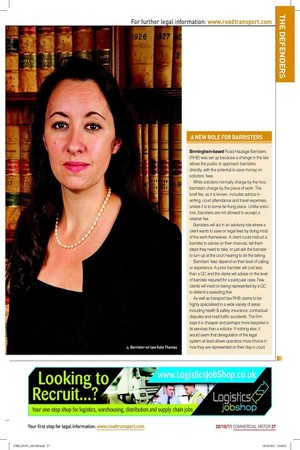A NEW ROLE FOR BARRISTERS
Page 19

If you've noticed an error in this article please click here to report it so we can fix it.
Birmingham-based Road Haulage Barristers (RHB) was set up because a change in the law allows the public to approach barristers directly, with the potential to save money on solicitors’ fees.
While solicitors normally charge by the hour, barristers charge by the piece of work. The brief fee, as it is known, includes advice in writing, court attendance and travel expenses, unless it is to some far-flung place. Unlike solicitors, barristers are not allowed to accept a retainer fee.
Barristers will act in an advisory role where a client wants to save on legal fees by doing most of the work themselves. A client could instruct a barrister to advise on their chances, tell them steps they need to take, or just ask the barrister to turn up at the court hearing to do the talking.
Barristers’ fees depend on their level of calling or experience. A junior barrister will cost less than a QC and the clerks will advise on the level of barrister required for a particular case. Few clients will insist on being represented by a QC to defend a speeding fine.
As well as transport law RHB claims to be highly specialised in a wide variety of areas including health & safety, insurance, contractual disputes and road traffic accidents. The firm says it is cheaper and perhaps more bespoke in its services than a solicitor. If nothing else, it would seem that deregulation of the legal system at least allows operators more choice in how they are represented on their day in court.










































